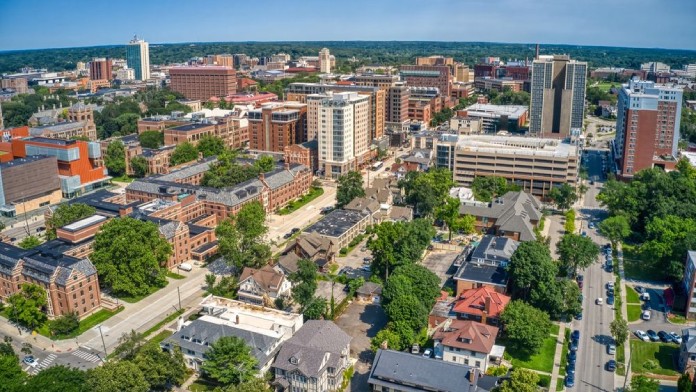Alcohol and Drug Statistics in Ann Arbor
Like many other cities around the country, drug and alcohol use is a major concern in Ann Arbor. Here is a breakdown that shows the impact of substance use disorder in Ann Arbor and Washtenaw County:2,3,4
- Washtenaw County reported 102 drug overdose deaths in 2021, with 78 of them involving opioids.
- Between 2020 and 2021, opioid overdose deaths in the county increased by 28% and non-opioid overdose deaths increased by 14%.
- Most residents who died of an opioid overdose were white, male, and between the ages of 25 and 44 years old.
- Between January 2021 and May 2022, fentanyl was involved in 82% of opioid overdose deaths in the county.
- Around half of all opioid overdose deaths also involved other drugs, including cocaine and methamphetamine.
- Most people in Washtenaw County sought treatment for alcohol use disorder, followed by heroin and cocaine.
- Between 2016 and 2020, 30.6% of driving deaths in Washtenaw County involved alcohol.
Paying for Alcohol and Drug Treatment Centers in Ann Arbor
Figuring out how to pay for a drug rehab or alcohol rehab in Ann Arbor can be overwhelming, especially if your finances are limited. However, some centers offer a variety of payment options.
Free Treatment Options in Ann Arbor
There are drug and alcohol rehabs near me that receive government contracts or grant funding from the state or federal government. These funds can be used to help cover treatment expenses for people who have little to no income. This can include inpatient programs that offer medically supervised withdrawal from opioids using methadone.
Rehab scholarships are sometimes available either through the rehab or a third-party group such as 10,000 Beds. However, this will take some additional research on your part to find out if you qualify.
The Dawn Farm Community of Programs offers free drug and alcohol rehab in Ann Arbor. There are additional centers in nearby Detroit.
Medicaid, Healthy Michigan Plan, and Medicare
Michigan’s Medicaid Health Care Program provides health care coverage, including treatment for substance use disorder, to low-income individuals and families. Typically the program serves the following people:5
- Age 65 or older
- Blind or permanently disabled
- Members of families with dependent children
- Pregnant Women
If you do not qualify for Medicaid, you can apply for the Healthy Michigan Plan. This insurance coverage provides benefits to Michigan residents at a low cost. You must meet the following qualifications:6
- Be between the ages of 19 and 64 years old
- Income at or below 133% of the federal poverty line
- Do not qualify or are not enrolled in Medicare
- Do not qualify or are not enrolled in Medicaid
- Are not pregnant when applying
- Michigan resident
Medicare is another government-funded healthcare program that provides treatment for those 65 years old and older. If you will be using any of these programs, you’ll need to find a center that accepts them as payment.
Private Insurance
Private insurance is required to cover at least some of the costs of substance use disorder treatment. However, the type of rehab and therapy covered will vary depending on your coverage. Therefore, you’ll want to check with your provider on what is covered and what is not to keep costs low.
You’ll also need to find an Ann Arbor drug or alcohol rehab that accepts your insurance provider for the services to be considered in-network. Choosing an in-network rehab will lower your out-of-pocket costs. Common private insurance companies in the Ann Arbor area include Aetna, Blue Cross Blue Shield, McLaren, and Humana.
Is it Easy to Travel to and Within Ann Arbor?
Whether you’re traveling to Ann Arbor for therapy or visiting a friend or family member at an Ann Arbor drug or alcohol rehab, you’ll find the city easy to navigate with much to offer. Ann Arbor is just 25 minutes from the Detroit Metropolitan Airport, with convenient shuttle options that will take you to the city. Amtrak and Greyhound also have stations in Ann Arbor.
The city’s downtown area is known for being very walkable. You can also utilize the public transit system called TheRide and Zipcar, a car-sharing service that allows you to reserve and rent cars by the day or hour. When walking downtown, keep an eye out for the hidden fairy doors sprinkled throughout the city.
There is no shortage of hotel options in the city and nearby towns. Ann Arbor offers budget options to more luxury hotels within walking distance of restaurants, shops, and museums.
Ann Arbor offers a mix of big city attractions and natural areas to explore. Festivals and events fill the local calendar most weekends. You can also enjoy kayaking, canoeing, and stand-up paddle boarding on the nearby Huron River. The University of Michigan is a major focal point of the city and offers award-winning art and archeology museums, theatrical and musical performances, athletic events, and a picturesque campus.
Resources
- University of Michigan Injury Prevention Center. (n.d.). Change in Michigan Overdoses During the COVID-19 Pandemic.
- Washtenaw County Health Department. (2022). Opioid Report.
- Michigan Department of Health and Human Services. (n.d.). Treatment Episode Data Set.
- Washtenaw County Health Department. (2022). Alcohol-Impaired Driving Deaths.
- U.S. Government. (n.d.). Michigan Medicaid Health Care Program.
- Michigan Department of Health and Human Services. (2022). Healthy Michigan Plan.



